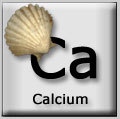Calcium

Apart from iron, calcium can be considered the most important metal for biological systems. Its wide availability and good bioavailability make it a central element for the formation of skeletal material (the body of an adult person contains ca. 1.5 kg Ca).
Ca2+ ions, along with K+ und Mg2+ ions, play an important role in signal transfer, in biological regulatory circuits, and in information processing. For these functions, Ca2+ ions are often bound to phosphate ions.
There is a large number of specific ligands, which are solely responsible for the physiological complexation of Ca2+ ions.
Biological functions of Ca2+ ions:
- Exoskeletons made of calcite and aragonite (CaCO3)
- Ca3(PO4)2 bone material in vertebrates
- regulatory element in cell division, insulin availability, blood thinning and signal transfer
- coordinative center for ATP-dephosphorylation, photosynthesis and glycogen break down
